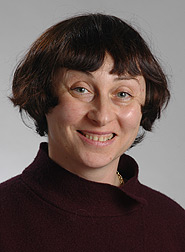Berkeleyan
Stem-cell grant to Berkeley bioengineer will spur research on rejuvenating muscle
Irina Conboy looks ahead to a time when, like now, many of us are falling apart . . . but we'll be able to do something about it
![]()
| 16 January 2008
Irina Conboy, assistant professor of bioengineering, is the recipient of a $2.25 million research grant from the California Institute for Regenerative Medicine (CIRM). The grant was announced in December by the state agency, which oversees the use of public funds for stem-cell research.
 Irina Conboy (Peg Skorpinski photo) |
Conboy, who hopes embryonic stem cells can rejuvenate aging muscles, was one of 22 recent Ph.D.s and M.D.s chosen by the Independent Citizens Oversight Committee, the governing board of the institute, to share $54 million in funding designed to boost the work of the next generation of stem-cell scientists.
Richard Murphy, interim president of CIRM, said in a statement that these grants "support scientists in the process of establishing their own laboratories and research programs at a point in their careers when grants are typically challenging to secure." Combined with previous grants to train graduate students and postdoctoral fellows, build new facilities, and purchase essential laboratory equipment, the state stem-cell institute has awarded the campus a total of $7.8 million.
"This is great news for Berkeley and especially for Irina, one of our young and very active stem-cell faculty," says Randy Schekman, professor of molecular and cell biology and director of the Berkeley Stem Cell Center.
Conboy, a 1998 Stanford University Ph.D., joined the Department of Bioengineering in 2004; she is a member of the Berkeley Stem Cell Center and an investigator with the California Institute for Quantitative Biosciences (QB3).
At Stanford and Berkeley she has focused on a major problem of aging: the deterioration of organs and tissues because the body fails to adequately repair normal damage.
"When you are young, all your wounds and bruises heal right away," Conboy says. "There is no problem healing your bones. But when you are old, you start falling apart, plus your ability to regenerate tissue declines. The goal of this work is to restore the second part. We will still be falling apart, but our ability to repair ourselves will be rejuvenated, and we will be similar to a young person."
Conboy got her idea from her continuing efforts to understand why old stem cells residing in old organs fail to repair damaged tissue even though they have the capacity to do so. She and colleagues reported in the journal Nature in 2005 that if young and old mice share blood, the young blood rejuvenates the responses of old stem cells. However, recent work from Conboy's laboratory shows that aged or pathological tissue appears to produce substances that inhibit young stem cells. Promisingly, the same work uncovered that embryonic stem cells are capable of neutralizing these unfortunate effects of aging and likely produce substances that encourage the repair of even old tissues, such as skeletal muscle.
Early experiments support this idea, she says: "If you simply co-culture embryonic and adult muscle cells, the adult muscle cells behave so much better. They produce huge chunks of muscle in culture, even when the muscle cells come from old mice."
New unpublished research already is leading her to the chemicals that stem cells produce to enhance tissue regeneration. Once identified, they could be used to directly improve degenerating muscle and, perhaps, other tissues in need of repair. The advantage of this over other approaches to tissue regeneration is that it avoids the problems associated with transplanting whole stem cells, such as immune rejection and the risk of formation of teratomas, which are cancers commonly associated with embryonic-stem-cell transplantation.
Shortly after arriving at Berkeley, Conboy joined professor Charis Thompson of gender and women's studies and rhetoric to sponsor a class on the social impacts of stem-cell research. Taught each semester since fall 2005 by students as part of the Democratic Education at Cal (DeCal) program, the course, Stem Cells: Science and Society, attracted more than 100 students during the fall semester. She also mentors, with Thompson, the Berkeley chapter of the Student Society for Stem Cell Research, an international organization that advocates stem-cell research for cures and that presents seminars, sponsors campus speakers, and visits local school classrooms.

